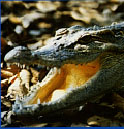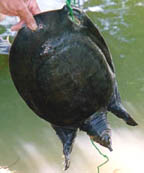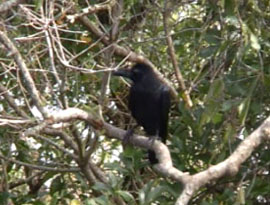Riverine
forest mammals--
An array of mammals is associated with riparian and swamp forest along
Asian rivers (Dudgeon, 2000c). They include a range of monkeys (notably
Proboscis monkeys: Nasalis larvatus), the Javan rhino (Rhinoceros
sondaicus), the Malayan tapir (Tapirus indicus), otters (Lutra,
Lutragale and Aonyx species), otter civets (Cynogale spp.)
and fishing cats (e.g.. Prionailurus planiceps and P.
viverrinus). Most of these animals are vulnerable or endangered (IUCN
2000). Riverine areas are also important for mammals such as Asian elephants
(Elephas maximus) because of the availability of fresh vegetation
(and water) during the dry season, which is an ecological 'crunch time'
for herbivores – especially large species.
Crocodilians--
 Crocodilians
(crocodiles, alligators and gharials) are an important and endangered
part of riverine biodiversity in Asia: eight out of 23 species known globally
occurs in the region; three are almost extinct and classified as critically
endangered (IUCN, 2000). For example, the last wild populations of the
Siamese crocodile (Crocodilius siamensis) are confined to small
areas in southern Lao PDR and Cambodia.
Crocodilians
(crocodiles, alligators and gharials) are an important and endangered
part of riverine biodiversity in Asia: eight out of 23 species known globally
occurs in the region; three are almost extinct and classified as critically
endangered (IUCN, 2000). For example, the last wild populations of the
Siamese crocodile (Crocodilius siamensis) are confined to small
areas in southern Lao PDR and Cambodia.
Turtles--
Approximately 90 species of non-marine turtles live in southern Asia,
over 20 of them in the lower Mekong  Basin.
Thirty-seven Asian turtle species were classified in the 1996 IUCN Red
List as vulnerable (VU), endangered (EN) or critically endangered (CR);
data on the status of a further 18 species were deficient (DD) although
they were thought to be at risk (van Dijk 2000). Four years later, the
2000 IUCN Red List (IUCN, 2000) contained twice as many threatened species
(18 CR, 27 EN, 21 VU and 6 DD) – i.e., almost three-quarters of Asian
turtles were threatened. Habitat degradation has contributed to their
decline. The greatest threat is overharvest by collection of animals from
the wild because turtle meat and shells are thought to have medicinal
value.
Basin.
Thirty-seven Asian turtle species were classified in the 1996 IUCN Red
List as vulnerable (VU), endangered (EN) or critically endangered (CR);
data on the status of a further 18 species were deficient (DD) although
they were thought to be at risk (van Dijk 2000). Four years later, the
2000 IUCN Red List (IUCN, 2000) contained twice as many threatened species
(18 CR, 27 EN, 21 VU and 6 DD) – i.e., almost three-quarters of Asian
turtles were threatened. Habitat degradation has contributed to their
decline. The greatest threat is overharvest by collection of animals from
the wild because turtle meat and shells are thought to have medicinal
value.
|
|
